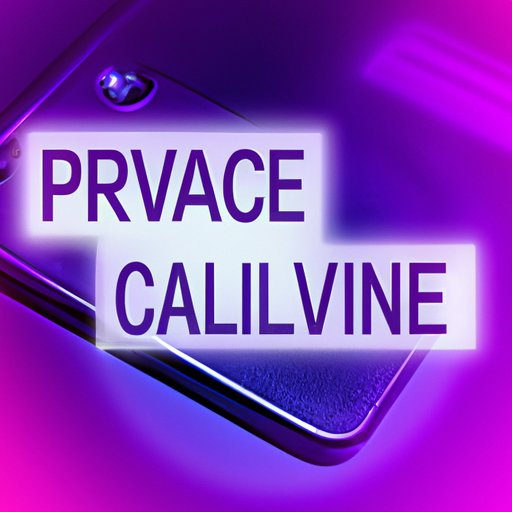
Introduction
Private dialing, or private calling, is the act of concealing your phone number or other identifying information during a call. It is important to keep phone calls private for a variety of reasons including personal privacy, security, and confidentiality. In this article, we will explore how to dial private, the dos and don’ts of private dialing, tips and tricks, and how you can protect your personal information.
Private Calling 101: A Beginner’s Guide
Private calling, as previously mentioned, is the act of hiding your phone number or other identifying information during a call. People might choose to use private calling for various reasons including keeping their identity anonymous, protecting their privacy, security, or preventing unwanted calls or spam. Private calling can be achieved in different ways, and it is important to note that not all methods may maintain your anonymity completely.
How to Make Your Calls Private: A Step-by-Step Guide
If you’re looking to make your calls private, there are several methods that you can use:
Step 1: Disabling caller ID
To disable caller ID on your smartphone device, follow these steps:
- Open your phone’s settings app.
- Scroll down and locate the phone app; tap on it
- Tap on the ‘Calls’ option
- Select the option ‘Additional Settings.’
- Click on the ‘Caller ID’ button and select the option ‘Hide Number’ or ‘No Caller ID.’
Step 2: Blocking your number using *67
You can also use *67 before dialing the phone number you wish to reach; this is a temporary solution to hiding your caller ID. Once you make the call, the number will be anonymous, and the recipient will not have any identifying information about your call.
Step 3: Using a private calling app
There are various private calling apps available on the app store that provide encrypted calls, end-to-end encryption and some even use blockchain technology for call security. Some of the popular private calling apps include Signal, Threema, and Telegram. Using such applications is a reliable approach to keeping your phone calls private.
Step 4: Using a burner phone or disposable number
A burner phone is a disposable device that is prepaid and typically doesn’t require identification to purchase. Using a burner phone can provide additional anonymity and privacy when making calls.
The Dos and Don’ts of Private Dialing: Tips for Securing Your Calls
Although private dialing is advantageous, it is important to remember some dos and don’ts when securing your calls.
Do enable additional security features
Some additional security features include enabling two-factor authentication, using a VPN, and using encrypted messaging apps. These features protect you from external threats.
Do use a strong password for private calling apps
When using private calling apps, it is essential to use a strong password that is difficult to guess.
Don’t use private calling for illegal activities
Be mindful that private calling does not make you anonymous and cannot protect you from legal actions if you’re involved in illegal activities.
Don’t reveal personal information during private calls
The purpose of private calling is to conceal your identity and protect your privacy. Do not divulge personal information, such as bank details, account numbers, or other sensitive information even when it seems unnecessary.
The Ultimate Guide to Dialing Private Numbers: Tips and Tricks
Tips for blocking caller ID permanently
To permanently block your caller ID, you can reach out to your mobile carrier to request anonymous calling. They can block your caller ID, ensuring that it remains anonymous whenever you make calls.
Tricks for using burner phones and disposable numbers more effectively
Keep in mind that a burner phone does not guarantee anonymity. For better results, purchase the phone using cash and avoid using it with your regular number.
Advice for using private calling apps
Ensure that you are using certified private calling apps to ensure that your calls are encrypted, safe, and secure.
How to Keep Your Phone Calls Private: Secrets Revealed
Some smartphone devices have hidden functions that can help keep your phone calls private:
Hidden privacy settings on smartphones
Look for settings like caller ID blocking, private mode, and voice privacy under ‘Settings’ on your smartphone device.
Additional tools for securing phone calls
You can encrypt your calls using a virtual private network (VPN) or encrypted voice calling app, which will ensure all your calls are encrypted and secure.
Securing your voicemail and call logs
Set a pin or passcode for your voicemail and regularly delete your call logs to prevent people from accessing your private information.
Private Dialing: Protecting Your Personal Information
Not keeping phone calls private can lead to people accessing your personal information. Such information includes your location, credit card details, and other pieces of information that have the possibility of compromising your privacy and security.
The risks of not keeping phone calls private
Without keeping your phone calls private, you may fall prey to scams, frauds and even identity theft.
Information that can be revealed during phone calls
Information that can be disclosed during phone calls includes your name, phone number, location, and your voice.
Steps to take if your private information is compromised
Immediately report to the relevant authorities companies or banks if your personal and financial information is revealed. You should also consider changing your password, PIN and regularly monitoring your credit report.
Conclusion
Private dialing is an effective way of securing your calls and personal information. By following a few simple steps and being mindful of the dos and don’ts, you can enjoy making private calls without compromising your safety.





